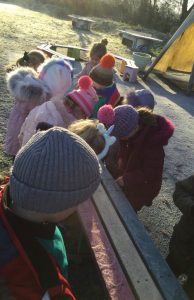- Early Years Transition Cards (1.51MB)
- EYFS Curriculum Overview 2022-2023 (1.51MB)
- Nursery Knowledge Organiser for Literacy (247.69KB)
- Nursery Knowledge Organiser for Mathematics (254.57KB)
- Nursery Knowledge Organiser for EAD (471.24KB)
- Nursery Knowledge Organiser for CL (311.49KB)
- Foundation Stage Policy (160.09KB)
The Early Years CurriculumThe Foundation Stage comprises the Nursery and Reception classes. The curriculum is broad and balanced, involving first hand experiences. Purposeful play features strongly and is the foundation for later learning. The curriculum is based on a series of topics but is continually adapted to build on the on-going interests and enthusiasms of the children. |
Hertfordshire Quality StandardsThe school was delighted to receive the Hertfordshire Quality Standards award in recognition of the school’s provision in the Early Years. |
In the Early Years we aim to: 
- help children make the transition from home to school with increasing confidence;
- create a welcoming atmosphere where children and their families feel secure, happy, confident and valued, whatever their gender, race, creed, culture or ability.
- provide a broad, balanced and “child centered” curriculum in a stimulating environment;
- provide a range of good quality, active learning experiences for children to develop intellectually, socially, emotionally and physically;
- ensure that all children have equal access to every experience available;

- help children grow in the understanding of the needs and feelings of others;
- develop a partnership with parents and provide links with the wider community.
Key features of our Early Years:
Early Learning Goals
The Foundation Stage curriculum is based on the goals to be achieved by the end of the Reception year across three prime areas and four specific areas of learning. A wide range of stimulating and practical activities and experiences are provided for the children to address these goals.
Prime Areas
| Communication and Language – The children are given many opportunities to develop their speaking, listening and understanding, key areas to all their learning. | Personal, Social and Emotional Development – The children are encouraged to develop their self-confidence and self-awareness. They are supported to manage their behaviour and feelings and to make friendships. | Physical Development – The children develop their gross and fine motor skills in practical activities. They also develop their independence in terms of self-care and in making healthy choices. |
Specific Areas
|
Literacy – Our main scheme is ‘Anima Phonics’ this provides the foundation for learning in phonics, reading and writing. We use a variety of reading materials which closely match the progression in the scheme. Please see main English page for more information. |
Mathematics – Children develop their understanding of number, shape, space and measure through hands on experiences. | Understanding the World – The children learn about the world around them including people, the natural environment and technology. | Expressive Arts and Design – The children explore a wide range of media and use their imagination in music, art and role-play. |
|
Child-initiated learning This is central to the children’s learning. Children have access to indoors and outdoors areas and take part in purposeful play. Children learn through: playing and exploring, active learning and through creating and thinking critically. |

